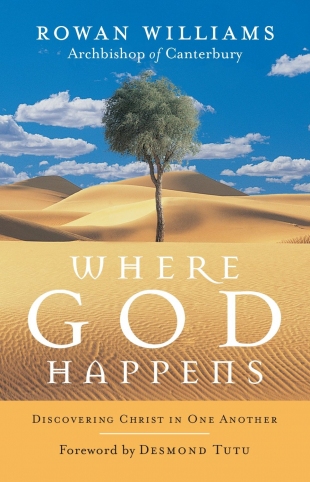"Saint Anthony of the Desert says that gaining a brother or sister and winning God are linked. It is not getting them signed up to something or getting them on your side. It is opening doors for them to healing and to wholeness. Insofar as you open such doors for another, you gain God, in the sense that you become a place where God happens for somebody else. God comes to life for somebody else in a life-giving way, not because you are good or wonderful, but because that is what God has done. So if we can shift our preoccupations, anxiety, and selfishness out of the way to put someone in touch with the possibility of God's healing, to that extent we are ourselves in touch with God's healing. So, if you gain your brother or sister, you gain God. . . .
"Some of the most interesting recent research on desert monasticism has been on the significance and understanding of common life among the first generations of monks. The surface pattern of 'running' or 'fleeing' from human contact is much more nuanced than it seems. What is to be learned in the desert is clearly not some individual technique for communing with the divine but the business of becoming means of reconciliation and healing for the neighbor. You 'flee' to the desert not to escape neighbors but to grasp more fully what the neighbor is — the way of life for you, to the degree that you put yourself at their disposal in connecting them with God. The unusual community that is the desert monastery of the first generation is not meant to be an alternative to human solidarity but a radical version of it that questions the priorities of community in other contexts. And this remains the most important function of any monastic community today — for the church and the wider world alike. . . .
"The neighbor is our life; to bring connectedness with God to the neighbor is bound up with our own connection with God. The neighbor is our death, communicating to us the death sentence on our attempts to settle who we are in our own terms and to cling to what we reckon as our achievements. 'Death is at work in us and life in you,' as Saint Paul says (2 Cor. 4:12), anticipating the themes of the desert. He is writing about how the apostle's suffering and struggle to make the life of Christ visible in such a way that others are revived in hope. And it is as others discover this life in hope that we receive it too, the gift we could not have expected as we, with such difficulty and reluctance and intermittent resentment, had to learn to let go of our own lives and learn how to attend in love to the neighbor. We love with God when and only when we are the conduit for God's reconciling presence with the person next to us. It is as we connect the other with the source of life that we come to stand in the place of life, the place cleared and occupied for us by Christ."
